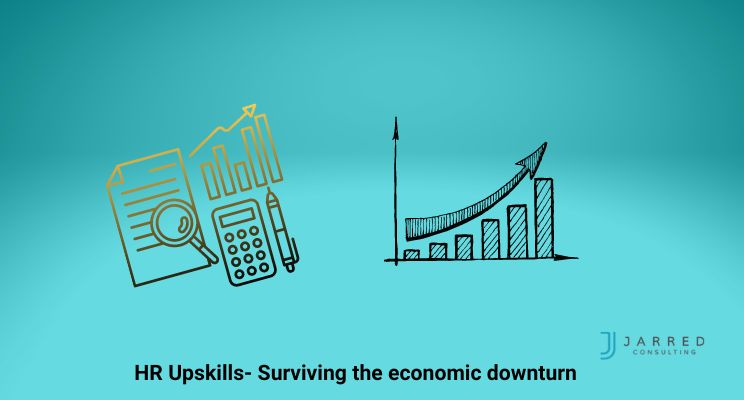Six essential HR upskills to survive an economic downturn
The great HR squeeze is upon us. On one side, inflation and recession put pressure on budgets but on the other, a reduction in the workforce pool and high demand for cutting-edge skills means competition for talent remains hot. How can you employ and retain the people you need while cutting your cloth accordingly? Getting this right means you’ll have the strength and agility to succeed through a recession and then pull ahead when the turnaround comes. Get it wrong and your business may not survive. It’s no secret that your HR department plays a key role in the make-or-break but its transformation will take insight and action on your part. In this article, we look at the forces colliding like never before as we sail into uncharted territory and how your people people are pivotal in getting you through to the other side.The great HR squeeze
The cyclical nature of recession and growth brings with it its own challenges in recruitment, redundancies and salary budget cuts. There are a number of factors that weigh in at this time however, so what worked before may not be so effective now. For example:- A Deloitte survey found that CFOs are expecting to pay more in wages over the next twelve months but in real terms, post-tax labour income (taking into account a higher cost of living) will shrink until 2024.
- The same survey found that there will be a fall in hiring expectations in the next couple of years and yet there is still a shortage in some skill areas not seen since the 1970s.
What does this mean?
With the days of the pandemic and the Great Resignation largely behind us, we’re still arguably dealing with the fallout. A considerable number of people are remaining at home with long-term health conditions while others have chosen to retire with savings, pension or another household income to rely on. One of the main tenets of the Great Resignation was that people wanted to restore some work/life balance, which is unlikely to go away with any kind of willingness. This has left a diminished workforce with altered expectations and needs. On the other hand, cost control mode has been activated with talk of a recession. The above Deloitte survey of CEOs found that last year just 13% felt that market instability would have an impact on business. Today, that’s 82%. So how do you bridge the gap between what you need and what you can physically afford?Go beyond salary
It’s time to think outside the box. Budgetary constraints may nudge you towards a conversation you should have been having anyway: namely, what do your people want? We’ve found that they crave:- A true sense of purpose. Get them excited about what you’re doing so that they put everything into their performance now and in the future. You’re all working towards achieving something that’s bigger than any of you.
- Equality, diversity and inclusion that aren’t just lip service. How do you show that you value everyone and their background? How do you make sure that every voice is heard, even the quiet ones?
- A partner in their career. How will you enrich the time that they spend with you? Personalised development and mentoring alongside opportunities for learning and progression will show them how much you value their personal contribution.
- Flexibility and respect for the whole person. Hybrid working eased the pressure for many during the pandemic, allowing them more time and energy to focus on their job without lengthy commutes or childcare restraints. Granted, you need to strike a balance to meet operational demands but what provisions could you make?
- A sound company culture. How attractive are you as a firm? Creating a safe space for empowered decision-making, two-way accountability and open communication means shifting from an employee-focused people deal to a human-based one.
- Reward and recognition that mean something. Gestures have to be relevant or they could be a waste of precious resources.
- Mental and physical well-being. These have naturally been at the top of the agenda over the past few years. We know that burnout is no longer an acceptable occupational hazard so what are you demonstrably doing to prevent it? How do you prioritise your team’s health?
Time for your HR Department to shine
None of this value-added work will happen without your HR department. The time has come to transform its role from an administrative hub to a source of empowerment for all your employees. As coordinators and facilitators, they will be key in imagining, implementing and managing systems and technology to support things like flexible working, recognition and career development. But it goes beyond this. They have to be dynamic, starting the conversation and steering it towards a vision.Ensure you have these six key skills in place:
Is your HR department able to:- Shift their focus away from remuneration and organisation sufficiently so that they can step up and provide the beyond salary elements above?
- Switch to a position of partner, advisor and sounding board?
- Build and nourish relationships at all levels?
- Keep information flowing and workloads balanced?
- Bring your purpose to life and allow it to infuse internal comms?
- Recognise training, coaching and mentoring opportunities?
